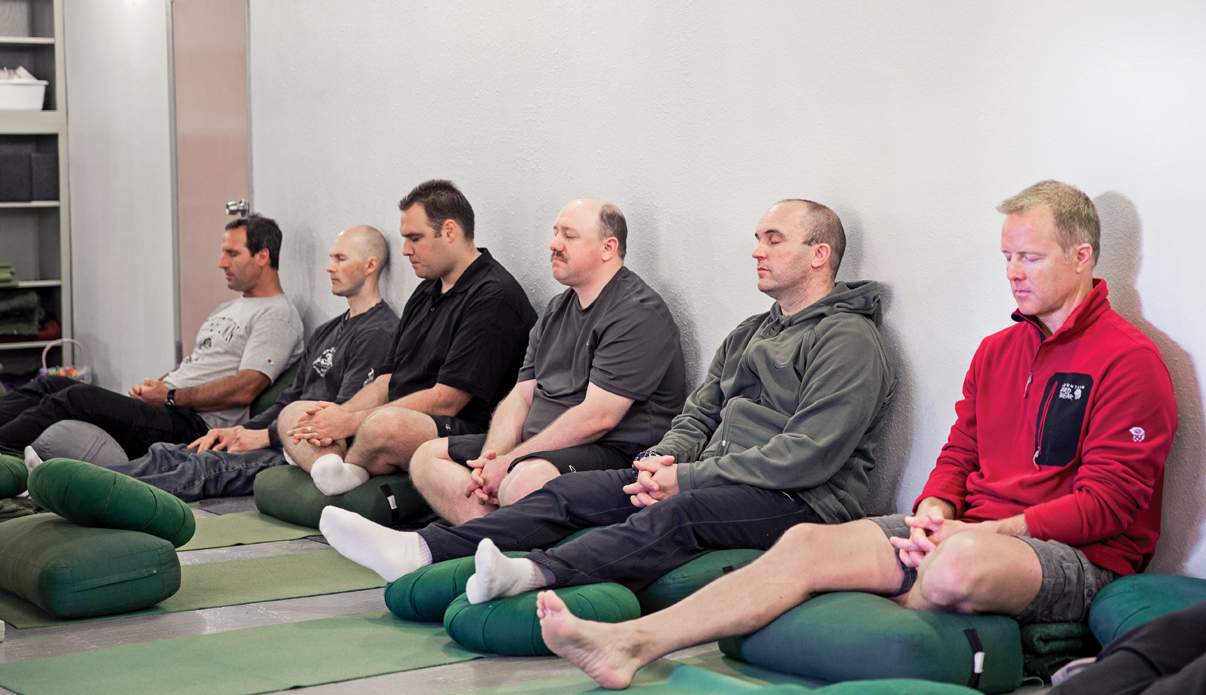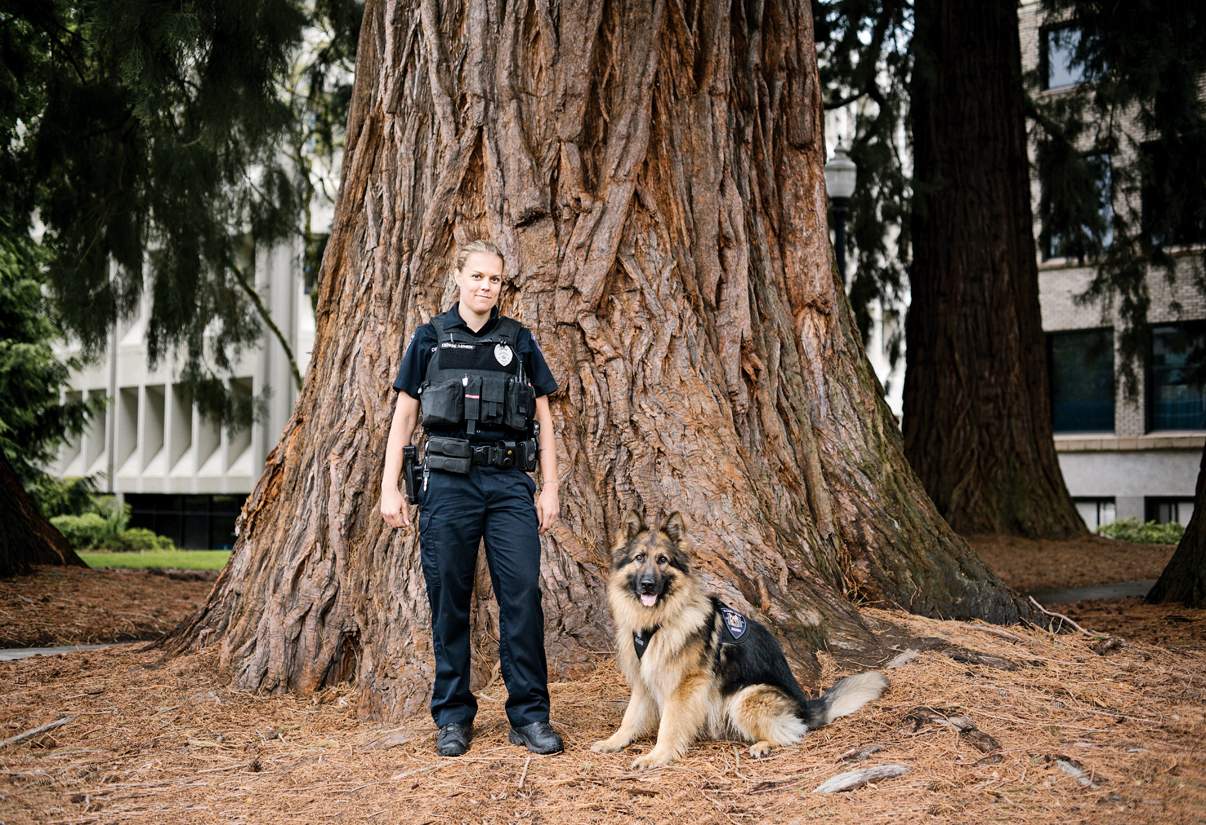On a Tuesday afternoon this spring, nearly two dozen cops from the suburbs of Portland, Oregon, ambled into foreign territory: a yoga studio. They were here for a unique course in mindfulness, one that proponents say could help transform policing.
As they settled in, they joked and jabbed with the ease of colleagues who have worked together for years. They piled up mats and pillows with the excessiveness of those who haven’t spent much time in savasana, some building nests that looked like La-Z-Boys.
On one side of the room sat an officer who recently had to confront a man hacking down a door with a Japanese sword—he was fighting off imaginary attackers. On the other side of the room was a former Marine sniper who had served in Iraq, with a haloed grim reaper tattooed on his arm.
Now, in this peaceful room, with the daylight dimmed by mauve curtains, these members of the Hillsboro Police Department were being asked to contemplate a raisin.
“Press on the raisin,” the instructor said in a soothing monotone. “Is it soft, rough, or smooth? Is there a stickiness?”
Everyone was engaging mindfully with their raisin—or so it seemed.
“We all knew what was crossing each other’s minds,” Officer Denise Lemen says later. “We all wanted to start shouting out one-liners.” If they’d so much as glanced at each other, they would have burst out laughing. Or worse.
“Being able to go there, and focus, is hard,” Lemen continues. “In my mind, I’m like, it’s a frickin’ raisin.” (Except she didn’t use the word “frickin’.”)
Introduction to Mindfulness in Policing
You may know the raisin exercise. You may recognize it as challenging. What you may not realize is just how difficult it is to run this exercise for cops—and how much it took to get them here. These officers have responded to homicides and suicides; they’ve removed children from abusive parents and slapped cuffs on drunk drivers; they’ve chased down robbers and been taunted by hostile gangbangers. They think of themselves as warriors. And now a shriveled old grape was making them feel like they were losing control.
“It was probably the most difficult thing I’ve done in a long time,” says Officer Lisa Erickson.
Yet, as uncomfortable as this class would get, the two dozen officers signed up because they knew something had to change. Their profession is tough. In Hillsboro, things were even worse. In fact, you might say that Hillsboro’s finest came to mindfulness the same way a drug addict comes to treatment: they hit rock bottom.
Historical Context of Hillsboro’s Police Department
Lieutenant Michael Rouches likes to say that when he joined the Hillsboro police force some 20 years ago, “we were 24 miles away from Portland but light years away from its progressiveness.”
In those days, Hillsboro was all about agriculture—the kind of town where kids were sometimes let out of school to help with the berry harvest. Back then, one of the larger employers was Carnation, the powdered-milk company.
In Rouches’ time here, the population has doubled, to 93,000 residents. There’s still agriculture—including vineyards of pinot noir and chardonnay grapes—and a sizeable Latino population supporting it. But now it’s mainly known as the center of Oregon’s “silicon forest,” where the drivers are biotech and high tech. Genentech, a company that makes blockbuster hormone therapy and cancer drugs, has a packaging-and-distribution facility here. Intel, the chipmaker, has 18,000 employees in Hillsboro, its largest site in the country. Those industries have attracted well-educated workers from around the globe.
For the city’s 120 sworn officers, policing here is challenging, as it is everywhere. As cops like to say, it’s 80% boredom and 20% sheer terror.
“This job,” says Officer Stephen Slade, “will break you down and crush your soul.”
Think about it. Cops take people to jail. They’re not happy. Cops give people tickets. They’re not happy. They arrest the husband who is beating his wife—only to have the wife jump on them because she doesn’t want him locked up.

“Everyone hates you,” Slade continues. A hulking 6-foot-5, he’s on the SWAT team and is called out in some of the most volatile situations. Twice in 10 months he was shot at. As he talked, he jostled his leg up and down, nonstop, for almost an hour.
sEveryone knows this job gets to you, says Sergeant Deborah Case. But you can’t act like it. “Our culture is such that we’re supposed to suck it up and not be impacted,” she says. And most police institutions still don’t do a heck of a lot to address these issues. At the police academy, Case says, they talk about stress-reduction strategies for maybe 15 minutes.
“You’re told to de-stress by working out,” says Lemen. A lean and fit K-9 officer, she does CrossFit and triathlons. “It’s weird,” she muses. “I’m still kind of stressed out….”
“We deny ourselves the experience of being human,” says Case. “It’s going to leach out somewhere.”
The Growing Challenges Faced by Hillsboro Police
That “somewhere” might be among their colleagues or while talking to law-abiding citizens. It might be on the street, where some officers are so amped that things escalate more than they should. Or it might be at home, where officers say they have trouble decompressing completely.
That’s what happened in late January in Hillsboro. Police were called to the home of Officer Timothy Cannon. The 13-year-veteran had been drinking heavily and was out of control, according to news reports. He was holed up in the house with his wife, his daughter, and a cache of weapons.
Over the next hour or so, 10 officers, including SWAT team member Slade, tried to coax him out. He told them he wouldn’t surrender, then threatened to shoot them, according to a transcript of the dispatch call. A fierce gun battle ensued, with as many as 100 shots fired. Cannon ultimately surrendered and was charged with 11 counts of attempted murder.
No one was seriously injured—at least physically. But to the department, it was devastating.
“We are so impacted by the toxicity of our profession,” says Lieutenant Richard Goerling, “so consumed by our jobs, we don’t know what to do.”
Figuring out what to do has been Goerling’s longtime crusade—and it’s what has led this suburban police department to some cutting-edge work.
“In our culture, we’re supposed to suck it up and not be impacted.” —Sergeant Deborah Case
• • •
Ask Brant Rogers—the soothing-voiced instructor with the raisins—how he got involved with the Hillsboro police department and he’ll laugh. A rail-thin 6-foot-8, he had the idea several years ago to offer a yoga class for police and firefighters. “I figured I’d just put it out there,” he says. “I didn’t know if anybody would show up.
“And sure enough, nobody showed up.”
Cops and firefighters, it turned out, were not interested in yoga. Except for one: Goerling. A member of the Coast Guard reserves with an MBA, he’s a little bit unusual for a cop. “I’m a contrarian in the business,” he says. “Because somebody needs to be.”
Some years back, Goerling began noticing how many of his colleagues were suffering from lower-back pain. He knew that elite athletes, including Shaquille O’Neal, were practicing yoga and thought it could help. So he went to Rogers for lessons. Then he started “sneaking in plugs for yoga” when he talked to his aching colleagues.
As he got to know Rogers better, he learned more. Rogers is an instructor of Mindfulness-Based Stress Reduction (MBSR), the program developed by Jon Kabat-Zinn at the University of Massachusetts, which began in 1979. From the moment he and Goerling began talking, Rogers recalled, they were “on the same wavelength.”
Goerling took Rogers’ MBSR course and began a practice of mindfulness, which he continues today. With a busy lifestyle, he found his four-times-aweek swimming habit to be a great place to practice. “You’re focused on sliding through the water, the sound of your breath in the water,” he says. “You find moments to be present in the moment you’re in.”
Goerling found that his mindfulness practice helped him be more patient at home, that it helped him deal with the stressors of his management position as a watch commander supervising two teams of 24 officers in total and as leader of the newly formed crisis intervention team, which focuses on responding more effectively to the needs of the mentally ill in crisis. It didn’t take long for him to begin to wonder how this could apply to policing itself. For instance: could mindful breathing help officers when they had to drive “code 3” to a call, with lights and sirens? Would being “present” help them handle calls involving people with mental illness? Would it help them with their own stress level?
He was certain it was worth a try.
“I began looking into how we build resilience so police officers can go through trauma—whether it’s acute or cumulative. How can they come out and be stronger?”
Goerling was also dedicated to the idea that when police are well themselves, they are able to treat citizens with greater empathy, which forges a greater connection with the whole community. He saw how improving emotion regulation and increasing self-awareness and attunement to others could both protect officers and help them be more effective on the streets.
Goerling began mentioning MBSR to his colleagues, but initially many of them saw it as a little too touchy-feely—something akin to the dreaded yoga.
“I don’t do yoga,” Megan Hewitt still insists. “I don’t understand yoga and I don’t want to do yoga.”
Goerling was undeterred. He began inviting Rogers to training events. Rogers remembers one vividly: a simulation of a Columbine-like shooting in a big empty warehouse. “People were dressed up like they were wounded, screaming, frantic,” he recalls. “Police cars were going with lights and sirens. Officers began jumping out of their cars and started running toward the warehouse. Gunshots were going off, and C-4 charges. “I was like, what am I doing here?”
At the end, Rogers said Goerling introduced him this way: “He said, ‘We have a mindfulness teacher here. How wild and crazy is that?’”
One officer came up and shook Rogers’ hand—a sign, to him, that the team was open. “We’re all human beings,” Rogers says. “No matter what we’re doing, we suffer, and this is a path out of the suffering.”
Well, maybe not so fast. One or two officers may have been curious. The rest? It would take something more than a handshake to convince them.
• • •

In the past few years, the military has begun seriously testing a variety of mind-fitness programs, like MBSR, with its troops. Where once military training focused mostly on wartime skills and physical fitness, the Pentagon is beginning to see the benefits in training soldiers to focus their minds through practices like meditation.
In 2009, a study published in the journal Joint Forces Quarterly gave Goerling something to work with. Marine reservists were trained before deployment in mindfulness practice, and a series of later tests showed that those who spent more time engaging in mindfulness saw improvements in their cognitive performance and felt less stressed than their colleagues.
This wasn’t the touchy-feely-hippie stuff cops loathed. These were warriors.
“The anecdotal and scientific evidence was just remarkable,” Goerling says. “You just couldn’t ignore it.”
Success Stories and Personal Testimonials
He went to the police chief and got the go-ahead to put together a class, taught by Rogers, at city expense. But before the program was launched, the department got a new police chief. And just like that, the MBSR course was dead.
“Basically, he had no use at all for mindfulness meditation,” Goerling says. “It was just a bunch of voodoo.”
The new chief would face far bigger problems. As his tenure wore on, his relationship with officers grew more and more strained. By 2013, there were two unfair labor practice complaints filed by the union and a lawsuit against the department filed by one of its own officers. Morale was tanking.
“It definitely was a hurricane,” the chief would later tell the local newspaper.
Meanwhile, it was clear that at least some officers were straying. One sergeant was disciplined after buying two gallons of maple syrup—expensing it to the city—then pouring some on a transit station bench. He later explained that was his way of preventing loitering.
And of course, there was the incident with Officer Cannon.
“That was the incident that snapped the organization,” Goerling says.
Six weeks later, the chief resigned. The city hired an interim, Ron Louie, who had served as Hillsboro’s chief from 1992 to 2007.
Louie, who in his retirement was teaching a class on “tactical communication” at Portland State University, was the son of Chinese immigrants. As a rookie cop in Palo Alto in the 1970s, he was among a handful of officers selected for an experimental program: they were sent off to a monastery, where psychologists trained them in a new way to handle difficult calls.
“Instead of walking into a crisis, taking out the baton, and throwing everybody in jail, we’d communicate,” says Louie. “Remember, this was a new thing in the seventies.”
Today, much of what he learned is widely accepted. Still, when cops confront bad guys, the first thing on their minds isn’t always reasoned discussion. It’s maintaining control.
“Most cops yell commands like crazy,” Louie says. “Drop the knife! Drop the knife! Drop the #*$% knife!”
Louie was interested in Goerling’s ideas. The department was clearly in need of some help, and with a six-month interim appointment, he had nothing to lose.
“One of the first things he did when he became chief,” Goerling recalls, “was to call me and say, let’s make this mindfulness thing happen.”
“The outcome of the police/ citizen encounter is dependent on how well I am as a police officer. If I’m not holistically well, I’m not going to regulate my emotions very effectively. I’m not going to be empathetic.” —Lieutenant Richard Goerling
• • •
What resulted was a nine-week class called Mindfulness-Based Resiliency Training, taught mostly by Rogers but with other experts brought in. Rogers would teach meditation, breathing, and other mindfulness techniques and throw in a little yoga, too. Officers would have homework, including readings and daily mindfulness practices, and would eventually engage in a daylong silent retreat.
A few officers, like Sergeant Case, who had already taken an MBSR course from Rogers at Goerling’s suggestion, decided to go through it again. The first time around, most of the benefits she noticed were in her personal life—in particular, when trying to get back on a horse after being thrown from the bucking animal.
“Every time I’d get back on, my whole body would shake,” Case says. “I couldn’t control the physical elements of the stress, no matter how badly I wanted this.
“There’s already shame attached to fear in my profession,” she continues. “Mindfulness practice allowed me to accept the feeling and not judge it—accept it and move forward instead of getting stuck.”
If this could help with such a powerful emotion as fear—that “body wash of terror,” as Case calls it—then she figured it could also help deal with the stresses of police work.
Many officers remained skeptical. Goerling wasn’t going to order anyone to sign up. Instead, he asked for volunteers, taking care to pitch the class as the stuff of warriors. “It’s the graduate school of tactical breathing,” he told them in an email.
That was something Slade, the SWAT team member, understood. As a sniper, you’re taught to control your breath, to squeeze the trigger during the few-seconds pause after you’ve fully exhaled. You have to keep your eye on a target. You have to sit still for hours. Maybe mindfulness, being “present” in the moment, would be useful for that. It might also help ease stress, as studies have shown.
“Maybe this will help me,” he thought. He agreed to sign up.
• • •
On the third day of mindfulness class, Chief Louie looked around the room approvingly. There were members of the hostage-negotiating team, the K-9 team, and a team that focuses on calls involving mental health problems. There were civilian employees of the police department, too.
“We have the best and the brightest in here,” he said.
Goerling hopes that these 24 officers will spread the word, and that, as time goes on, the whole force (121 sworn officers and 41 professional staff) can go through Rogers’ MBSR class.
Overcoming Skepticism and Cultural Barriers
Rogers has had to adjust his teaching for the audience. He tries to use the language of cops—forget Buddhist and Sanskrit terms—sprinkling his discussion with terms like “tactical” and “strategy” and “situational awareness.”
The typical MBSR lingo, about being “present in the moment,” wasn’t necessarily going to resonate here. Instead, he tells them, “Pay attention to what’s happening around you. Notice the thoughts….”
Language choices aside, the upshot of mindfulness training is to help police decrease reactivity and increase thoughtful responsivity; to be assertive rather than aggressive. Without a doubt, this is the heart of good police work. Officers with these skills will be better able to relate to the wife who doesn’t want her abusive husband arrested, better able to communicate and think clearly under stress. In a nutshell: better able to help the people in their communities whom they have sworn to serve and protect.
To get the message through to police, Rogers takes care to liken this mental fitness work to the physical fitness activities that law-enforcement culture has long embraced. “Over time, the shape and size of the brain is changing,” he tells the officers. “You’re reshaping how the mind works, just like you’re reshaping the body.”
Every week Rogers takes the class through a 30- to 40-minute body-scan meditation. When you get distracted, he tells them, just notice that, without judgment. Then bring your thoughts back to the body. “Each time you do that, that’s a rep,” he says. At one point in class, he flexes his arm like he’s doing bicep curls. Practicing mindfulness, he says, is like building “muscle memory. It’s like doing reps.”
Implementing Mindfulness-Based Stress Reduction (MBSR)
All this is great conceptually. But as Slade points out, you’re asking this of police officers. As he and the others lie down in Rogers’ studio with their eyes closed, he can’t help thinking, “Anybody can burst in that door and take full advantage of us. Part of me is saying, you’ve got to stay on high alert because you never know. …”
Out on the street, he adds, “My life depends on it.”
Goerling says that’s called “hypervigilance.” And it’s not healthy, it’s not sustainable, and it’s not protective.
The mindfulness class “isn’t about being relaxed,” he says. “It isn’t about eliminating stress. It’s about being aware of what stress is doing and mitigating its impact.”
Like the others, Officer Eric Russell, the tattooed former Marine sniper, came to the class with a dose of skepticism. The homework alone requires that something’s got to give—like sacrificing an hour at the gym, for instance. “It really is a big investment,” he says. “A blind investment.”
Still, he’s determined to be open-minded. If there’s something that will give him an edge out on the streets, then he’s all for it. He thinks about what he has to juggle every time he gets in his police car. There’s an earpiece where he hears the voice of the dispatcher. There’s a police radio in the car, which may or may not be tuned to the same channel. There’s a computer screen that spits out information about calls and suspects. Then there’s the regular car radio, which he can tune to his favorite radio station. And then there’s the driving, sometimes with lights and sirens.
“As officers, we spend so much time fine-tuning this craft of multitasking,” he says. The mindfulness class seems to be asking him to do just the opposite: to “sit here and focus on one concept.”
He pauses for a moment, thinking further about what goes on in the police car. “It’s a catastrophe waiting to happen,” he concedes. “Maybe now I can acknowledge that the distractions are taking place but focus on one thing.”
Lemen, too, is giving it a shot. As a K-9 officer, she says, “I’ve been taught that my stress runs down-leash to my dog. If my dog is a little calmer, maybe I’ll be a little more successful. Maybe because I’m doing this mindful stuff, maybe that will help me not be so amped up.”
As she was going through her daily routine of putting on her bulletproof vest, belt, gun, and boots, she realized something: she could put on her uniform in a mindful way, rather than letting her mind race. That would be good practice. Engaging mindfully with routine daily tasks, she reasoned, could help her in the field, when things are much, much more complicated.
• • •

Goerling has a hypothesis: “The outcome of the police/citizen encounter, every single one, is in large part dependent on how well I am as a police officer. If I’m not physically well, that creates some problems. If I’m not emotionally well, holistically well, I’m not going to regulate my emotions very effectively. I’m not going to listen very effectively. I’m not going to be empathetic.”
Mindfulness, he believes, is “where emotional intelligence and wellness come together.” If officers are trained in mind work, if they practice it, they’ll feel better. They’ll police better. And that’s good for the community.
This isn’t just about tiny Hillsboro, Oregon, either. If Goerling had his way, officers wouldn’t be driving around in the police cars that Russell described. “How do we design a cockpit that is less demanding on the cognition of police officers?” he wonders. Where else can we make cops’ work easier? Can his officers—a group who was brave enough to go through this unusual class—play a role in shaping police work across the country?
“My vision is that we become the epicenter of positive cultural change in law enforcement,” says Goerling.
“Because of our perfect storm of where we are, because of how screwed up things are, a lot of good things are happening.”





